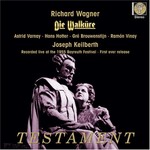
Wagner: Die Walkure (complete opera) (Recorded in stereo live at the 1955 Bayreuth Festival)
 $90.00
Out of Stock
$90.00
Out of Stock6+ weeks add to cart
RICHARD WAGNER
Wagner: Die Walkure (complete opera) (Recorded in stereo live at the 1955 Bayreuth Festival)
Astrid Varnay / Gre Brouwenstijn / Hans Hotter / Ramon Vinay / Bayreuth Festival Orchestra / Joseph Keilberth
[ Testament / 4 CD Box Set ]
Release Date: Friday 23 June 2006
This item is currently out of stock. It may take 6 or more weeks to obtain from when you place your order as this is a specialist product.
"The second instalment of what is proving to be a definitive Ring...Hans Hotter is the crowning glory of this instalment, fresher-voiced than for Solti. But there isn't a weak link in a cast that we can only dream of today. As for Joseph Keilberth, he takes his place alongside Furtwängler and Krauss as a truly great Ringconductor."
Editor's Choice Gramophone Magazine September 2006)
Rosette Recording - Penguin Stereo Guide
"The second instalment of what is proving to be a definitive Ring...Hans Hotter is the crowning glory of this instalment, fresher-voiced than for Solti. But there isn't a weak link in a cast that we can only dream of today. As for Joseph Keilberth, he takes his place alongside Furtwängler and Krauss as a truly great Ringconductor."
Editor's Choice Gramophone Magazine September 2006)
"You will hear singers move about the stage, the bloom of the Festival House acoustic and deep richness in the engineering...Witness the stirring basses and cellos in the opening storm, the clarity of woodwinds throughout and, most impressively, these recordings correct the over-emphasis on voices that undermines contemporaneous radio broadcast recordings from Bayreuth."
(MusicWeb August 2006)
It is as if a much-treasured and irreplaceable family
heirloom feared lost for ever has suddenly reappeared thanks to the unexpected care and generosity of some beneficent, distant relative. The benefactor in this instance is Testament. The heirloom in question about to make its belated entry into the record market is the very first stereo recording of Wagner's Ring cycle made 50 years ago at Bayreuth.
And glorious it sounds in its newly remastered version, so much so that it is hard to believe it has not been released before. Indeed, so many years have now elapsed since the 1955 Bayreuth recording was made that many of us who knew about it never believed that it would ever materialise. Yet it is a musician's dream, sung and played by an ensemble unmatched in its perfection and produced ten years before Maestro Solti finished conjuring up his magical version, which was to become the standard Wagner Ring recording. I dare make this claim because I became deeply involved in the Bayreuth project. It came about when Wieland Wagner, grandson of the composer and imbued with the genius of his forebear, had translated to the stage a production still considered by most as a benchmark of excellence and taste. He had at his disposal a cast of unparalleled talent and, thanks to Bayreuth's considerable resources and not forgetting its famous acoustic, Decca was able to record this exceptional production for posterity.
The freshness of the sound is especially noteworthy. But it was only after weeks of rehearsal that the talented Decca team with whom I modestly claim kinship was able to pinpoint the correct disposition of its microphones. Even extraneous production noises caused by lighting bridges which moved during performances or Wolfgang Windgassen's over-exuberant forging of Siegfried's sword were overcome by this matchless team of engineers led by Kenneth Wilkinson, then Decca's senior recordist. Little did we think then that the results of our teamwork would languish unheard until many of the participants in this almost forgotten enterprise had gone to their own Valhalla.
To hear these recordings is to thrill again at the splendour of the orchestral playing so brilliant that we did not resent the hours spent sitting in the darkness of the theatre or of our recording room while the sun shone enticingly outside. The Bayreuth Festival orchestra comprised some of Germany's best players from both west and east and they came together in holiday mood, Lederhosen and all, to give of their best in quite superlative performances. Holding such an ensemble together required the experience and masterly direction of the conductor Joseph Keilberth, with his intimate knowledge of the theatre and of the Ring cycle. Inspired by the wonderful singing of his cast, he gave performances which no one would want to miss.
I congratulate Testament for its persistence in finally
making possible the release of these extraordinary recordings.


![Gotterdammerung (complete opera) (Recorded in stereo live at the 1955 Bayreuth Festival) [second cycle] cover](https://images.marbecks.co.nz/_thumbnails/10151/10151130.jpg)
